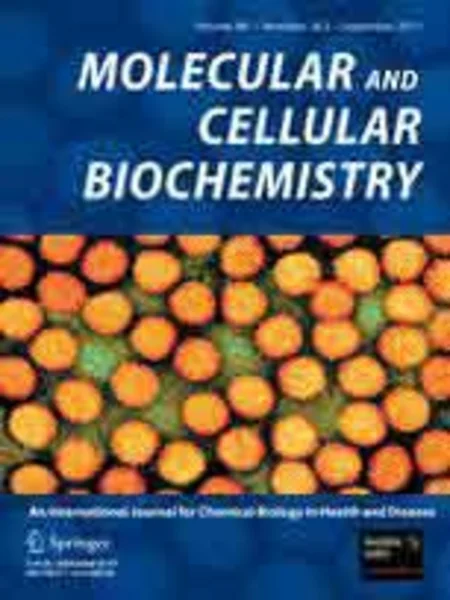-
advanced glycation end products delay corneal epithelial wound healing through reactive oxygen species generation
جزئیات بیشتر مقاله- تاریخ ارائه: 1392/07/24
- تاریخ انتشار در تی پی بین: 1392/07/24
- تعداد بازدید: 883
- تعداد پرسش و پاسخ ها: 0
- شماره تماس دبیرخانه رویداد: -
delayed healing of corneal epithelial wounds is a serious complication in diabetes. advanced glycation end products (ages) are intimately associated with the diabetic complications and are deleterious to the wound healing process. however, the effect of ages on corneal epithelial wound healing has not yet been evaluated. in the present study, we investigated the effect of age-modified bovine serum albumin (bsa) on corneal epithelial wound healing and its underlying mechanisms. our data showed that age-bsa significantly increased the generation of intracellular ros in telomerase-immortalized human corneal epithelial cells. however, the generation of intracellular ros was completely inhibited by antioxidant n-acetylcysteine (nac), anti-receptor of ages (rage) antibodies, or the inhibitor of nadph oxidase. moreover, age-bsa increased nadph oxidase activity and protein expression of nadph oxidase subunits, p22phox and nox4, but anti-rage antibodies eliminated these effects. furthermore, prevention of intracellular ros generation using nac or anti-rage antibodies rescued age-bsa-delayed epithelial wound healing in porcine corneal organ culture. in conclusion, our results demonstrated that age-bsa impaired corneal epithelial wound healing ex vivo. age-bsa increased intracellular ros generation through nadph oxidase activation, which accounted for the delayed corneal epithelial wound healing. these results may provide better insights for understanding the mechanism of delayed healing of corneal epithelial wounds in diabetes.
مقالات جدیدترین رویدادها
-
استفاده از تحلیل اهمیت-عملکرد در ارائه الگوی مدیریت خلاقیت سازمانی و ارائه راهکار جهت بهبود
-
بررسی تاثیر ارزش وجوه نقد مازاد بر ساختار سرمایه شرکت های پذیرفته شده در بورس اوراق بهادار تهران
-
بررسی تأثیر سطح افشای ریسک بر قرارداد بدهی شرکت های پذیرفته شده در بورس اوراق بهادار تهران
-
بررسی تأثیر رتبه بندی اعتباری مبتنی بر مدل امتیاز بازار نوظهور بر نقد شوندگی سهام با تأکید بر خصوصی سازی شرکت ها
-
تأثیر آمیخته بازاریابی پوشاک ایرانی بر تصویر ذهنی مشتری پوشاک ایرانی (هاکوپیان)
-
بررسی تاثیر عناصر معماری بر فرهنگ و هویت اجتماعی (مطالعه موردی: جزیره کیش)
-
بتن از سازه تا معماری، از مقاومت تا زیبایی
-
بررسی اثر آنتی اکسیدانی اسانس رزماری برکاهش عدد پراکسید سوسیس فرانکفورتر
-
general expressions for the calculation of air flow and heat transfer rates in tall ventilation cavities
-
blow-up of solutions for a nonlinear beam equation with fractional feedback
مقالات جدیدترین ژورنال ها
-
مدیریت و بررسی افسردگی دانش آموزان دختر مقطع متوسطه دوم در دروان کرونا در شهرستان دزفول
-
مدیریت و بررسی خرد سیاسی در اندیشه ی فردوسی در ادب ایران
-
واکاوی و مدیریت توصیفی قلمدان(جاکلیدی)ضریح در موزه آستان قدس رضوی
-
بررسی تاثیر خلاقیت، دانش و انگیزه کارکنان بر پیشنهادات نوآورانه کارکنان ( مورد مطالعه: هتل های 3 و 4 ستاره استان کرمان)
-
بررسی تاثیر کیفیت سیستم های اطلاعاتی بر تصمیم گیری موفق در شرکتهای تولیدی استان اصفهان (مورد مطالعه: مدیران شرکتهای تولیدی استان اصفهان)
-
بررسی ادله صحت ایقاع فضولی در قانون با رویکردی بر فقه امامیه
-
بررسی نقش افشای اینترنتی اطلاعات بر واکنش بازار به تصاحب شرکت های بزرگ: ضمن تاکید بر نقش رقابت اطلاعاتی بین سرمایه گذاران آگاه
-
سیستم مدیریت دانش در شهرداری تهران
-
the role of expert system in granting credit facilities
-
laser drilling of small holes in different kinds of concrete




سوال خود را در مورد این مقاله مطرح نمایید :